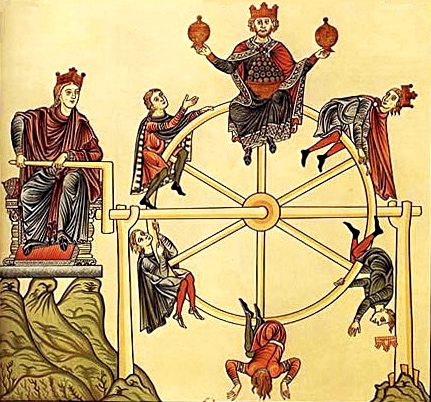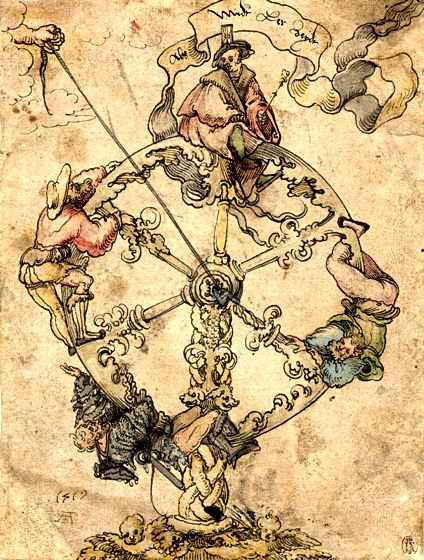
The meanings we care about first and foremost are good and bad. Not good and evil—not ethics, not yet—but good and bad for us. We want to know how the wheel of fortune will turn. Will particular people, things, and events be blessings—or disasters? Where do goodness and badness come from, and how can we influence them? What do good and bad events imply for other dimensions of meaningness—social relations, our selves, and our purposes?
Eternalism promises answers: certainty about what is good and what is bad, and understanding and control over what produces them. However, “good” and “bad” are not intrinsic qualities.1 Reality is not about us, and doesn’t know or care whether it benefits or harms us. “Good” and “bad” are not merely unpredictable; they are inherently nebulous: mixed, shifting, ambiguous. Thus, broad answers to “will good things or bad things happen?” are impossible.
And so, again, eternalism cannot deliver. Relying on its claims about good and bad is a recipe for disappointment, if not disaster.
Elaborating meanings of good and bad
Eternalism is about seeing meaning where there is none, and adding extra meaning even to what is already genuinely meaningful. Chance events—turns of the wheel of fortune—are taken not just as good or bad, but meaningfully good or bad.
Eternalism gives good and bad events implications for all the dimensions—purpose, ethics, our selves, social relations, and so on. Good outcomes are mistaken as rewards or confirmations. Bad ones appear as omens of still worse to come, or deserved punishments, or as tests from God.
The “just world hypothesis” is the pervasive assumption—explicit or tacit—that good and bad outcomes are not random, but deserved. The eternal ordering principle guarantees that. This is the beginning of the elaboration of good and bad into good and evil. Good and Evil often become independent actors: as vague “forces,” or personified as spooks,2 human individuals, or social groups.
Eternalistic systems typically promise good outcomes—for those who obey the demands of the eternal ordering principle. Bad outcomes are due to violations of the cosmic order. Violations can be reversed by purification, which restores the order.
If the eternal order can be violated, then how is it eternal? And, how can bad things happen to good people? Many outcomes are obviously random; eternalism is obviously wrong, as everyone knows at some level. Various strategies of self-delusion cover this up, in order to preserve an optimistic outlook. Elaborate theories of cosmic justice in the afterlife are attempts to preserve eternalism against everyday experience. When these eternalistic ploys fail, nihilism looms.
Good, bad, naturalism, and supernaturalism

A major theme of this chapter on eternalism is that errors usually attributed to supernaturalist religions are also common among atheists, and in naturalistic ideologies. This includes mistaken ideas about good and bad—but those are particularly prone to supernatural explanations.
In the short run, good and bad manifest as luck. A feeling of being lucky, or unlucky, is nearly impossible for even the most committed secular scientific rationalist to avoid at times. “I get duped by eternalism in a casino” is a personal account of such an incident. In “No cosmic justice” I observed that:
A vague, incoherent expectation of cosmic justice is one of the hardest aspects of our Christian heritage to shake off. I am a life-long atheist, and have never actually believed in cosmic justice. Yet I still sometimes catch myself hoping that I will somehow be magically rewarded for good deeds.
Magical thinking is a powerful eternalist ploy. It promises certainty about the spinning wheel of fortune, through esoteric techniques such as divination, psychobabble, and career counseling. Imaginary connections “explain” random coincidences. Underlying all this is the assumption that the universe is about us—and since our lives are meaningful, everything else must be, too.
Explicitly non-supernatural eternalisms make the same promises. Communism guarantees a good outcome for history: eventually capitalism must collapse, and be replaced by a worker’s paradise. UFO cults expect imminent salvation by benevolent aliens. Techno-futurists are sure a Singularity will soon deliver us from all material afflictions (or perhaps doom us to sudden extinction). These are all silly, but they postulate no supernatural forces.
Fate, destiny, and finality

In the long run, eternalism sees good and bad as the concern of fate. Proper distribution of good and bad is the main point of the Cosmic Plan. Both individuals and social groups (tribes, nations, even our species) supposedly have fates.
We are particularly concerned about what happens in the end. This is the matter of destiny. It is commonly considered that the only real meaning—of an object, event, life, or group—is the meaning it has as it ends. Whatever may happen before that doesn’t properly count.3 As an extreme case, in some versions of both Christianity and Buddhism, the only thing that matters for determining your fate in the afterlife is your mind state at the moment of death.
The final meaning is the eternal meaning, and therefore the “real” one. This discounts most actual meanings, in favor of eternalistically-ascribed ones—which is wrong. We’ll see later that this error leads to nihilism, when you realize that nothing is meaningful to you after you die.
Eternalism promises good outcomes to those who obey. Miserabilism, a stance closely connected with nihilism, guarantees everyone bad outcomes.
Beyond good and bad
Humans (and other animals) evolved to force-fit everything into the categories “good,” “bad,” and “irrelevant.”4 We make snap judgements about these three—and are often proven wrong. Some events are unambiguously one way or another; but even the most important ones usually have both good and bad aspects. We acknowledge this in phrases like “a silver lining” and “a mixed blessing.”
Recognizing the nebulosity of meanings is the way out of the maze of eternalism and nihilism, and into the complete stance. Suspending judgements of “good” and “bad” and “uninteresting” is a particularly effective escape route. Playful curiosity is characteristic of the complete stance. “What is this like?” and “How does it work?” and “What happens if…” are usually better questions than “Is this good, or bad?”
Qualifying judgements of good and bad is essential in adequate approaches to ethics and politics, particularly. (These will develop into major points later in the book.)
DESTINY: A tyrant’s authority for crime and a fool’s excuse for failure.5
Interpreting good and bad as good and evil turns them into absolutes, over which no compromise is possible. Ever-escalating embroilment ensues. Dropping good and evil is a first step toward a non-eternalist ethics. (Although only a first step—replacing them with “harm and benefit” can lead to eternalist utilitarianism, for instance. Those, too, are nebulous—so utilitarianism can’t succeed as an eternalist system.)
For politics to be anything more than a quantitative showdown, both sides in a conflict must recognize the nebulosity of their interests. Not only are those people not simply evil, and us folks not simply holy: what they want is not purely wrong, and what we want is not an unalloyed good. When all can drop the moral posturing, all may be able to work together to find an outcome all can live with—which will not be good, bad, or uninteresting, but a nebulous combination of all three.
- 1.They are not merely our opinions, either, though. As with all meanings, they are neither objective nor subjective.
- 2.Benevolent and malevolent spooks, as causal explanations for good and bad outcomes, are a cultural universal. Sometimes there are also moody spooks who alternate capriciously: a sensible explanation for the randomness of good and bad events. I find it sad and telling that few care what spooks think or do when it doesn’t affect humans.
- 3.I don’t know where this idea comes from. It’s obviously nonsense, but pervasive. I’ve tried to construct an explanation in terms of evolutionary psychology, according to which what mostly matters is whether you get progeny to adulthood before dying. An estimate of whether you are likely to succeed critically affects your optimal life strategy. The less likely evolutionary success is, the more evolutionarily rational high-stakes gambles (such as murder, rape, and robbery) become. I haven’t been able to make this explanation work, quite. Perhaps the source of the idea is mere cultural accident.
- 4.Presumably this is an efficient strategy for animals with simple brains and simple lifestyles. It doesn’t work well for humans, but brain evolution hasn’t caught up with cultural evolution. Also: the Buddhist influence on this book should be unusually obvious here. Buddhism holds that “attraction, aversion, and indifference” are the cause of all suffering. I think that’s an oversimplification, but insightful nonetheless.
- 5.Ambrose Bierce, The Devil’s Dictionary.
